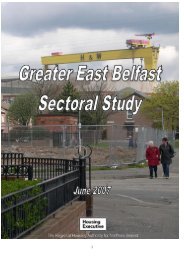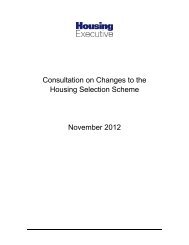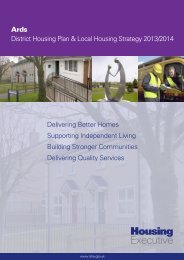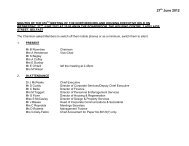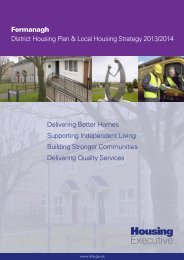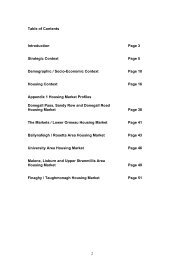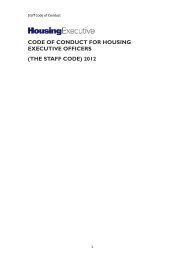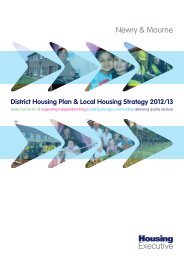Renting Privately - a Strategic Framework - Northern Ireland ...
Renting Privately - a Strategic Framework - Northern Ireland ...
Renting Privately - a Strategic Framework - Northern Ireland ...
You also want an ePaper? Increase the reach of your titles
YUMPU automatically turns print PDFs into web optimized ePapers that Google loves.
enting privately<br />
a strategic framework<br />
Housing<br />
Executive<br />
THE REGIONAL STRATEGIC HOUSING AUTHORITY FOR NORTHERN IRELAND
enting privately<br />
a strategic framework<br />
Housing<br />
Executive<br />
THE REGIONAL STRATEGIC HOUSING AUTHORITY FOR NORTHERN IRELAND
“The important<br />
role that the<br />
private rented<br />
sector plays<br />
within the overall<br />
housing market<br />
and the wider<br />
community<br />
has been<br />
recognised and<br />
acknowledged”
FOREWORD 4<br />
SECTION 1: INTRODUCTION 7<br />
SECTION 2: CONSULTATION AND POLICY ISSUES 9<br />
SECTION 3: AIM AND OBJECTIVES OF THE STRATEGY 13<br />
SECTION 4: IMPLEMENTATION 25<br />
SECTION 5: CONCLUSION 27<br />
APPENDIX IMPLEMENTATION PLAN 28
“Today the<br />
private rented<br />
sector is a<br />
key part of<br />
<strong>Northern</strong> <strong>Ireland</strong>’s<br />
housing market”
Foreword<br />
In recent years there has been a resurgence in private renting in<br />
<strong>Northern</strong> <strong>Ireland</strong>: from 38,00 units in 1996 to 49,400 in 2001.<br />
Today the private rented sector is a key part of <strong>Northern</strong> <strong>Ireland</strong>’s<br />
housing market and represents 7.6% of our total housing stock.<br />
The sector provides homes for people across the economic and<br />
social spectrum and meets housing need and demand from a<br />
range of households from highly paid professionals to the most<br />
vulnerable people in our community.<br />
In April 2003, the Department for Social Development consulted<br />
on proposals for a new legislative framework to replace <strong>Northern</strong><br />
<strong>Ireland</strong>’s existing outdated private rented sector legislation.<br />
In June 2003, the Housing Executive issued for consultation a<br />
Draft Strategy for the private rented sector in <strong>Northern</strong> <strong>Ireland</strong>.<br />
This Draft Strategy contained proposals for policy and practice<br />
which sought to improve the management and the operation of<br />
the sector.<br />
Initial consultation showed that there was widespread support<br />
for the introduction of a coherent strategic framework for the<br />
private rented sector. As a result staff from the Department for<br />
Social Development and the Housing Executive have worked<br />
together in the past few months to integrate the proposals. This<br />
document, therefore, sets out the strategic framework for dealing<br />
with the legislative, strategic and operational issues which will<br />
influence the sector in the future and which will be implemented<br />
in partnership with others.<br />
We would like to thank all those who responded to the consultation<br />
and who helped to develop this strategic framework. We believe<br />
this framework will promote and sustain a healthy private rented<br />
sector. A sector which offers greater choice and flexibility and,<br />
at the same time, improves the quality and management of<br />
the accommodation it provides. We look forward to implementing<br />
this framework and to building on the partnerships which have<br />
already been established through its development.<br />
ALAN SHANNON<br />
Permanent Secretary<br />
DSD<br />
PADDY MCINTYRE<br />
Chief Executive<br />
NIHE
“Consultation<br />
has demonstrated<br />
that there is<br />
widespread<br />
support for the<br />
introduction of<br />
a coherent<br />
strategic<br />
framework for<br />
the private<br />
rented sector in<br />
<strong>Northern</strong> <strong>Ireland</strong>”
SECTION 1: Introduction<br />
The private rented sector in <strong>Northern</strong> <strong>Ireland</strong> plays a vital role<br />
in the overall housing market and provides accommodation for<br />
those who are unable, or would prefer not to, access home<br />
ownership or the social rented sector. Although the sector<br />
experienced decline through most of the twentieth century,<br />
there has been a steady increase since 1991 in the number of<br />
dwellings available for private renting and it now makes a<br />
significant contribution to meeting housing need and rising<br />
demand.<br />
The sector is diverse and complex and until recently there had<br />
been little research carried out into its position within the<br />
housing market. It has been acknowledged that the legislation<br />
governing the sector, the Rent (NI) Order 1978, is cumbersome<br />
and outdated. This complex legislation focuses primarily on<br />
rent control which is determined by the letting history of the<br />
property. As such, it does not focus on unfitness or provide<br />
remedies for poorer quality housing in the sector.<br />
Initial consultation has demonstrated that there is widespread<br />
support for the introduction of a coherent strategic framework<br />
for the private rented sector in <strong>Northern</strong> <strong>Ireland</strong>. The<br />
Department for Social Development has consulted on<br />
proposals for amendments to the legislation pertaining to the<br />
sector and the Housing Executive has consulted on proposals<br />
for a strategic approach to private renting. Following on from<br />
consultation, the Department for Social Development has<br />
determined a new legislative structure for the private rented<br />
sector which aims to target unfitness and disrepair, reduce<br />
inequities between tenure types and simplify, clarify and raise<br />
awareness of landlord and tenant obligations. The Housing<br />
Executive has also developed a strategy which will introduce<br />
practical and achievable goals for policy and practice, to<br />
improve both the perception and operation of the sector.<br />
This policy statement provides a unified structure of legislative,<br />
strategic and operational changes which will shape government<br />
intervention in the sector over the coming years. The need for<br />
legislative change and the key features of the new structure to<br />
be introduced are explained. The strategic and operational<br />
policies which flow from this have been developed through<br />
consultation and aim to build on the strengths of the sector<br />
while tackling its weaknesses. Partnership working between a<br />
range of government and voluntary agencies will be a key<br />
feature of this integrated strategy which has been designed to<br />
have a positive impact on the supply, condition and<br />
management of the private rented sector.<br />
7
“New legislation<br />
is required which<br />
will address<br />
inequities and<br />
more effectively<br />
target unfitness”
SECTION 2: Consultation and policy issues<br />
Department for Social Development Consultation<br />
on Review of Legislation<br />
In April 2003, the Department for Social Development issued a<br />
consultation document ‘Private Rented Sector in <strong>Northern</strong><br />
<strong>Ireland</strong>: Proposals for Reform’. Overall, there was widespread<br />
general support for the proposals and the responses to<br />
consultation confirmed that the main areas of concern in<br />
relation to the current legislation governing the private rented<br />
sector are as detailed below.<br />
Addressing disrepair and unfitness<br />
It is accepted that the current complex and unwieldy legislative<br />
structure is failing to meet its original objectives of improving<br />
conditions in the private rented sector. Significant problems of<br />
disrepair and unfitness remain both within the controlled sector<br />
and also within the uncontrolled sector where there is an<br />
absence of regulation. There are major differences regarding<br />
access to repair remedies, as controlled tenants have access<br />
to statutory repair remedies whereas uncontrolled tenants have<br />
only limited access under Public Health legislation. There is<br />
support for the introduction of a more simplified legislative<br />
structure, based on a determination of ‘fitness’, which would<br />
address inequities and more effectively target unfitness.<br />
Rents<br />
There are marked differences between the amount of rent<br />
chargeable under controlled and uncontrolled tenancies.<br />
Controlled tenancies are governed by a complex system of<br />
registration and independent appeal and have their rents<br />
determined in accordance with a legislative formula.<br />
Uncontrolled tenancies are subject to no statutory regulation<br />
and market forces determine the amount of rent chargeable.<br />
The current application of rent control imposed by the Rent<br />
Order has little impact on the condition of the property and it is<br />
accepted that it would be more appropriate to introduce a<br />
system of ‘fair rents’ linked to the Fitness Standard.<br />
Security of Tenure/Succession<br />
Controlled tenancies under the current legislation have<br />
extensive security of tenure and statutory protection covering<br />
rent levels, deposits and succession rights. However,<br />
uncontrolled tenancies, which are the majority of private rented<br />
tenancies, have very little security and no rights of succession.<br />
This disparity of rights between the controlled and uncontrolled<br />
sectors needs to be addressed.<br />
9
Advice, information, training and publicity<br />
There is evidence, supported by agencies working on the<br />
ground in the private rented sector, that there is a lack of<br />
awareness among both tenants and landlords of current legal<br />
rights and responsibilities. It has been accepted that there<br />
needs to be comprehensive and co-ordinated advice,<br />
information and publicity provided in relation to the private<br />
rented sector and in particular regarding the introduction and<br />
application of a new legislative framework which will apply to<br />
the whole of the sector. There is support for this to be provided<br />
by a multi-agency approach. There would also appear to be<br />
support for the establishment of a voluntary disputes resolution<br />
mechanism to arbitrate in disputes between landlord and tenant<br />
in order to minimise costly and protracted legal action.<br />
Housing Executive Consultation on a Strategy for<br />
the Private Rented Sector<br />
In June 2003, the Housing Executive issued a consultation<br />
document ‘Private <strong>Renting</strong>: A <strong>Strategic</strong> <strong>Framework</strong>’. This<br />
consultation highlighted a number of common themes which<br />
have been addressed in this document, as detailed below.<br />
Housing Benefit<br />
Many private rented sector tenants are dependent on housing<br />
benefit and many responses were in relation to difficulties being<br />
experienced by these households. Although housing benefit is<br />
administered by the Housing Executive, it is a social security<br />
payment made in the name of the tenant. The housing benefit<br />
regulations therefore, are determined by the Department for<br />
Work and Pensions and are normally applied nationally and<br />
therefore are beyond the scope of this review. However,<br />
developments in relation to changes proposed in housing<br />
benefit will be monitored. Research in relation to local<br />
reference rent levels and discretionary housing benefit<br />
payments will also be conducted in order to determine the<br />
impact these have on affordability in the private rented sector.<br />
Grants<br />
The provision of grant aid to landlords has made a significant<br />
contribution to tackling unfitness in the private rented sector.<br />
Many of the responses to consultation were in relation to the<br />
grants process and the system of landlord contribution. It is<br />
accepted that a more strategic approach to the improvement of<br />
housing conditions in the private rented sector and targeting of<br />
available resources where they are needed most is required.<br />
This will be facilitated by the recent introduction of a mainly<br />
discretionary, as opposed to mandatory, grants system.<br />
10
Affordability<br />
Responses highlighted issues of affordability and difficulties<br />
experienced by low-income households in the private rented<br />
sector that were not felt to have been adequately reflected in<br />
the strategy. In order to address this, Objective 4 of the strategy<br />
has been amended.<br />
Facilitating high management standards<br />
It is widely accepted that managing property to a high standard<br />
and ensuring that tenancies run smoothly is by no means an<br />
easy task and that landlords should be supported and<br />
encouraged in this role. The responses to consultation<br />
indicated that there is wide support for the dissemination of<br />
good practice, the development of guidance for letting and<br />
renting property, and for providing support and training for<br />
landlords.<br />
Inter agency partnership working<br />
Improvements in the private rented sector will best be achieved<br />
through partnership working and a multi-agency approach,<br />
which identifies and promotes good practice. The responses to<br />
consultation support this approach and forums for key<br />
stakeholders in the sector will be established.<br />
Improvements<br />
in the private<br />
rented sector<br />
will best<br />
be achieved<br />
through<br />
partnership<br />
working and<br />
a multi-agency<br />
approach, which<br />
identifies and<br />
promotes good<br />
practice.<br />
Further research<br />
A number of areas where further research is required were<br />
identified in the consultation document and the responses to<br />
consultation confirmed and supported these. Further research<br />
is underway with more research planned for the near future.<br />
This will help develop knowledge of the sector and inform the<br />
implementation of the strategy, as it evolves.<br />
11
“Our aim is to<br />
promote and<br />
sustain a<br />
healthy private<br />
rented sector”
SECTION 3: Aim and objectives of the strategy<br />
Aim<br />
To promote and sustain a healthy private rented sector, which<br />
offers choice and flexibility by influencing supply and securing<br />
a better quality, better managed sector.<br />
Objectives<br />
1 To create a legislative structure for the private rented sector<br />
which addresses inequities and targets unfitness through<br />
repair enforcement and rent control<br />
2 To clarify and promote the rights and responsibilities of<br />
private rented sector landlords and tenants<br />
3 To improve housing conditions in the private rented sector<br />
4 To facilitate housing choice, by promoting the private rented<br />
sector as a viable and affordable housing option<br />
5 To influence the levels of supply of accommodation available<br />
for private renting<br />
6 To promote high standards of management within the private<br />
rented sector.<br />
Objective 1<br />
To create a legislative structure for the private<br />
rented sector, which addresses inequities and<br />
targets unfitness through repair enforcement<br />
and rent control<br />
“ Any regulation<br />
will be based on<br />
a determination<br />
of fitness”<br />
Categorisation of tenancies<br />
In order to remove many of the inconsistencies and inequities<br />
of the present system and address the problems in the sector it<br />
is proposed to introduce a two-tier system of regulation based<br />
on a determination of ‘fitness’, as defined in the Housing (NI)<br />
Order 1992, Schedule 5.<br />
All tenancies will be categorised according to fitness. The<br />
distinction between restricted and regulated tenancies in the<br />
controlled sector will be abolished and replaced by a<br />
determination of fitness.<br />
In future, new tenancies of properties which are deemed to<br />
meet the Fitness Standard will be uncontrolled. A determination<br />
of fitness will be required for all new lettings not falling into the<br />
‘deemed fit’ category (see below). Other tenancies will be<br />
inspected for fitness at the request of the landlord or tenant or<br />
by any statutory authority. All shorthold tenancies will become<br />
uncontrolled tenancies on expiry of the present tenancy term.<br />
13
As a consequence of these measures, the question of whether<br />
a tenancy is let furnished or unfurnished will cease to have any<br />
relevance to its status.<br />
Rents<br />
A new system of ‘fair rents’ will be applied to controlled and<br />
‘interim controlled’ properties through independent inspection.<br />
Rents will be based on the Housing Executive’s points scheme<br />
as at present, but consideration will also be given to other<br />
factors such as local reference rents, furnishings, outbuildings<br />
and gardens. The listing and assessment process will be more<br />
simple and streamlined than the current registration system.<br />
Fitness inspections<br />
Information from the House Condition Survey 2001 indicates<br />
that the majority of unfit properties were constructed before<br />
1945 with the vast majority falling into the pre 1919 category.<br />
Using a cut off date of 1945 will serve to focus enforcement<br />
action on those properties considered most likely to be unfit.<br />
New tenancies of properties built before 1945 will require a<br />
fitness inspection prior to reletting. Most properties currently<br />
controlled under the Rent (NI) Order 1978 are likely to require<br />
a fitness inspection. Any private tenancy will also be inspected<br />
on request by the landlord or tenant or by any statutory<br />
authority. A fitness certificate issued as the result of an<br />
inspection will be valid for a period of 5 years, regardless<br />
of any change of tenancy during this period, unless a<br />
re-inspection is requested.<br />
The new system of regulation aims to be speedy and selfregulating,<br />
as far as possible. It is proposed to place<br />
responsibility for fitness inspections with local councils. The<br />
legislation will require the landlord of rental property to have a<br />
fitness inspection carried out, where required, by the local<br />
council. Local council environmental health departments will<br />
have responsibility for conducting these inspections and a<br />
suitable fee will be determined. Where the property is found to<br />
be unfit on inspection, an appropriate Schedule of Works<br />
required to make the property fit will be completed. Liaison with<br />
the Housing Executive will be instigated where it becomes<br />
necessary to issue a Repairs Notice. After a further inspection<br />
to confirm compliance with the Schedule, the local council will<br />
confirm that the property meets the Fitness Standard.<br />
All properties found to be unfit on inspection will be ‘interim<br />
controlled’ by the local council. Rent control, through the Rent<br />
Officer Service, will apply until the work required to render the<br />
property fit has been completed. Rents will be determined as<br />
14
for controlled tenancies. This new system envisages a more<br />
active implementation of the Repair Notice procedure to deal<br />
with unfitness where this is found to be the most appropriate<br />
course of action.<br />
Security of tenure and succession<br />
The security of tenure and tenancy succession rights currently<br />
applicable to existing controlled tenancies, whether or not<br />
registered, will be modified. The lifetime security of tenure,<br />
which currently applies to three successive tenants within a<br />
single ‘chain of succession’, will be abolished.<br />
Lifetime security of tenure will be limited to the current tenant,<br />
with succession restricted to the spouse or partner of the tenant<br />
or, in the absence of a spouse or partner, to a family member<br />
resident with the tenant for one year at the time of the death of<br />
the tenant. No further succession will be possible where the<br />
current ‘chain of succession’ has been completed, that is,<br />
where the existing tenant was the second successor to the<br />
tenancy under the provisions of the Rent (NI) Order 1978.<br />
Action Points<br />
• Introduce new legislation in accordance<br />
with Departmental policy<br />
• Convene the multi agency partnership to<br />
bring forward comprehensive information<br />
and guidance for all interest groups<br />
• Arrange information seminars for all<br />
interest groups<br />
• Produce and disseminate information<br />
materials<br />
Objective 2<br />
To clarify and promote the rights and<br />
responsibilities of private rented sector<br />
landlords and tenants<br />
The private rented sector in <strong>Northern</strong> <strong>Ireland</strong> provides homes<br />
for a diverse range of households, including some of the most<br />
vulnerable people in our society. There is evidence to suggest<br />
that there is a lack of awareness of rights and responsibilities<br />
among both tenants and landlords. This is compounded by the<br />
15
“ The introduction<br />
of new legislation,<br />
more appropriate<br />
to the private<br />
rented sector<br />
of today, will<br />
address the<br />
present inequities<br />
in relation to<br />
rights and<br />
responsiblities”<br />
fact that the current legislation in relation to the private rented<br />
sector, the Rent (NI) Order 1978, is cumbersome and outdated.<br />
Under this legislation, certain tenancies are ‘controlled’ by the<br />
Rent Order and there are statutory entitlements and<br />
obligations, which cover rent, deposits, security of tenure,<br />
succession and repairing remedies. The controlled sector is in<br />
decline, with the number of properties being ‘de-controlled’ on<br />
vacancy exceeding those being registered.<br />
The majority of private rented sector tenancies in <strong>Northern</strong><br />
<strong>Ireland</strong> are uncontrolled. These tenancies are subject to<br />
minimal intervention, open market rents can be charged and<br />
the tenants have few legal rights. Rent levels, deposits,<br />
tenancy terms and repairing obligations are all matters for<br />
negotiation between landlord and tenant and should form the<br />
basis for the tenancy agreement. However, the experience of<br />
agencies working on the ground would suggest that written<br />
tenancy agreements are often not provided and the conditions<br />
of the tenancy are not specified. This leads to an absence of<br />
any real form of recourse for both tenants and landlords if<br />
problems with the tenancy arise.<br />
The proposed new legislative structure for the private rented<br />
sector will help to address these difficulties. This new structure<br />
will replace the Rent (NI) Order 1978 and will rationalise the<br />
complexity of private rented sector legislation generally. The<br />
introduction of new legislation, more appropriate to the private<br />
rented sector of today, will address the present inequities in<br />
relation to rights and responsibilities.<br />
It is proposed to make a written tenancy agreement mandatory<br />
for all private tenancies with the form and content of these<br />
being prescribed by regulation. A default tenancy term of 6<br />
months will also be provided in legislation. This will apply to all<br />
private tenancies, other than controlled tenancies, but only in<br />
cases where a tenancy agreement has not been provided or<br />
where one fails to specify the duration of the tenancy. Where<br />
the default tenancy term is in force, the tenancy will be deemed<br />
to continue for successive periods of 6 months until a tenancy<br />
agreement specifying a term is provided or a valid Notice to<br />
Quit brings the tenancy to an end.<br />
Default repairing obligations for both parties will be provided in<br />
legislation. These will apply in the absence of any more specific<br />
obligations set out in the tenancy agreement and the rent book<br />
or where either of these has not been provided. The default<br />
repairing obligations will be similar to those provided in Articles<br />
41 to 45 of the Rent (NI) Order 1978, which currently apply to<br />
regulated tenancies.<br />
16
As the provision of comprehensive advice, information and<br />
training for all stakeholders was highlighted as necessary, a<br />
multi agency partnership approach will be established,<br />
comprising all the key players in the sector. The need for a<br />
disputes resolution mechanism will be further researched and it<br />
is proposed to conduct a pilot voluntary disputes project to<br />
arbitrate in disputes between landlord and tenant.<br />
The Action Points and activities planned to achieve this<br />
objective are detailed below.<br />
“ A multi-agency<br />
approach for<br />
advice, information<br />
and training will<br />
be established”<br />
Action Points<br />
• Establish a forum for agencies providing<br />
advice and assistance to private rented<br />
tenants and landlords<br />
• Co-ordinate and conduct an advertising<br />
and awareness campaign on rights and<br />
responsibilities for private rented<br />
tenants and landlords<br />
• Co-ordinate an improved multi-agency<br />
service of advice, assistance and support<br />
for private rented tenants and landlords<br />
• Produce best practice standard<br />
documentation which may be used by<br />
private sector tenants and landlords,<br />
including model tenancy agreements<br />
• Research and evaluate the need and<br />
desire for the provision of an Arbitration<br />
Service and possible options for delivery.<br />
Objective 3<br />
To improve housing conditions in the private<br />
rented sector<br />
One of the prime objectives of this Strategy for the private<br />
rented sector in <strong>Northern</strong> <strong>Ireland</strong> is to improve the quality of<br />
accommodation and reduce unfitness in the sector. The stock<br />
in the private rented sector is generally old in comparison to<br />
other tenures and the unfitness rate is higher. In 2001, the<br />
overall unfitness rate in <strong>Northern</strong> <strong>Ireland</strong> was 4.8%. However,<br />
in the private rented sector the rate of unfitness was 8.7%,<br />
17
“ One of the prime<br />
objectives of<br />
this Strategy for<br />
the private<br />
rented sector in<br />
<strong>Northern</strong> <strong>Ireland</strong><br />
is to improve<br />
the quality of<br />
accommodation<br />
and reduce<br />
unfitness in<br />
the sector”<br />
compared to 2.8% in the owner occupied sector, 2.1 % in<br />
housing association stock and 0.8% in Housing Executive<br />
stock. It is now time to take a strategic approach to the<br />
improvement of housing conditions in the private rented sector<br />
and target limited resources where they are needed most.<br />
This will be facilitated by the new Discretionary Grants System,<br />
which was introduced by the Housing (NI) Order 2003.<br />
The Department for Social Development’s Review and<br />
proposals for new legislation in relation to the private rented<br />
sector should also enable a more focused approach to<br />
addressing unfitness. Under these proposals, the fitness of a<br />
property will be the determining factor as to whether a property<br />
is made subject to any form of rent control. This control of rent<br />
in properties determined as unfit will be one method used to<br />
address unfitness.<br />
Repair enforcement<br />
A new, cooperative, service delivery mechanism in relation to<br />
repair enforcement between district councils and the Housing<br />
Executive is envisaged, as follows:<br />
• Where a local council assesses an occupied dwelling to be<br />
unfit, a Schedule of Works with costings will be drawn up for<br />
consideration by the Housing Executive, together with a<br />
notice indicating the council’s intention to serve a Repair<br />
Notice in 28 days. This system of scheduling and costing is<br />
already in place and working effectively in relation to other<br />
housing matters.<br />
• If the Housing Executive deems the most appropriate<br />
course of action to be a Closing Order, Demolition Order<br />
or Deferred Action Notice, it will notify the council of its<br />
intention to issue such an order or notice, as a consequence<br />
of which the council will take no further action.<br />
• If the Housing Executive considers a Repair Notice to be<br />
the most appropriate course of action it will notify the local<br />
council, which will serve a Repair Notice and pursue<br />
enforcement.<br />
In <strong>Northern</strong> <strong>Ireland</strong> there is currently a gap in the range of<br />
enforcement remedies available to tackle serious disrepair<br />
falling short of unfitness. Section 190 of the 1985 Housing Act<br />
applicable in England and Wales provides for Repair Notices<br />
to be issued in relation to serious disrepair falling short of<br />
unfitness. An amendment introduced in the 1989 Local<br />
Government and Housing Act qualified the application of this<br />
power, which now only applies to tenanted properties and to<br />
properties located within renewal areas. Authorities also have<br />
18
discretion to exclude properties due to be included in a group<br />
repair scheme within 12 months. It is proposed to introduce<br />
similar provisions to <strong>Northern</strong> <strong>Ireland</strong>, which will be available<br />
across all private sector tenancy types. The introduction of<br />
these powers will also ensure that risk of physical injury, now<br />
excluded from action under Public Health legislation as a result<br />
of a Court of Appeal ruling, can be addressed.<br />
Article 3 (1) (a) and (b) of the Defective Premises (Landlord’s<br />
Liability) Act (NI) 2001 will be repealed, thus ensuring that all<br />
landlords are liable for defective premises regardless of the<br />
status of the tenancy.<br />
The Action Points and activities planned to improve the quality<br />
of accommodation available for renting in <strong>Northern</strong> <strong>Ireland</strong> are:<br />
Action Points<br />
• Introduce new legislation capable of<br />
tackling unfitness and disrepair more<br />
effectively<br />
• Determine the current nature and<br />
condition of stock in the private rented<br />
sector<br />
• Implement a co-ordinated approach to<br />
addressing unfitness and determining<br />
priorities, to ensure the most appropriate<br />
action is taken in instances where unfit<br />
properties are identified<br />
• Develop, in consultation with District<br />
Council EHOs, a system for enforcing<br />
repairing obligations<br />
• Determine the potential for targeting<br />
grants under the Discretionary Grants<br />
System when priorities have been<br />
identified<br />
• Examine how fuel poverty in the private<br />
rented sector can be addressed and<br />
energy efficiency improved.<br />
19
Objective 4<br />
To facilitate housing choice, by promoting the<br />
private rented sector as a viable and<br />
affordable housing option<br />
“ We aim<br />
to facilitate<br />
housing choice<br />
and promote the<br />
private rented<br />
sector as a viable<br />
and affordable<br />
housing option”<br />
One of the strengths of the private rented sector is its flexibility<br />
and ease of access and this should be acknowledged and built<br />
upon. For a range of people in short term housing need, for<br />
example newly formed households and young mobile singles,<br />
it provides easy access accommodation. For many lower<br />
income households it can provide longer-term accommodation,<br />
often where they are unable to secure social housing,<br />
particularly in areas of high housing stress. However, access<br />
and entry into the private rented sector can be difficult or<br />
restricted. There is often a lack of awareness of the availability<br />
in the sector and of the possibility of private renting being an<br />
alternative, affordable tenure for those in housing need.<br />
Landlords with accommodation to rent may also face difficulties<br />
when trying to identify suitable tenants for their property.<br />
One of the main objectives of this strategy, therefore, is to<br />
facilitate housing choice and promote the private rented sector<br />
as a viable and affordable housing option. The desired outcome<br />
is to ensure more effective alignment of private rented sector<br />
supply with demand and to realise the potential for the sector<br />
to assist in meeting housing need.<br />
The main Action Points and activities planned to achieve this<br />
objective, by increasing awareness of and improving access<br />
to the sector, are detailed below:<br />
Action Points<br />
• Assess demand for and interest in private<br />
rented sector accommodation when<br />
assessments for housing are carried out<br />
under the Common Selection Scheme<br />
• Assess demand for and interest in the<br />
private rented sector through rural latent<br />
demand testing<br />
• Increase awareness of the private rented<br />
sector among applicants for housing and<br />
the general public<br />
20
• Research the dynamics of the private<br />
rented sector in relation to inter-tenure<br />
flow of stock and tenants<br />
• Research how the Housing Executive, in<br />
partnership with other bodies, could<br />
promote the private rented sector<br />
• Evaluate existing access schemes (Rent<br />
Guarantee Scheme, Smartmove), to<br />
determine their effectiveness and make<br />
recommendations for the development<br />
and/or expansion of such schemes, taking<br />
account of affordability issues<br />
• Explore the potential for alternative<br />
models of temporary accommodation for<br />
homeless applicants within the private<br />
rented sector accommodation<br />
• Research issues of affordability in the<br />
private rented sector, including housing<br />
benefit.<br />
Objective 5<br />
To influence the levels of supply of<br />
accommodation available for private renting<br />
The role that the private rented sector plays in <strong>Northern</strong> <strong>Ireland</strong><br />
varies from one location to another. It is vital therefore, that the<br />
supply of private rented accommodation is influenced in<br />
accordance with effective up to date local market analysis of<br />
supply and demand. In areas of high housing stress, the private<br />
rented sector should be encouraged to play a greater role in<br />
meeting housing need, which may have previously been met by<br />
the social housing sector. However, in areas of low demand,<br />
care should be taken to avoid an over supply of affordable<br />
accommodation for rent, which could result in decline of the<br />
neighbourhood and all the associated social and economic<br />
problems.<br />
The main Action Points and activities which the Housing<br />
Executive plan to implement in order to achieve this objective<br />
are detailed below. These will assist in assessing local market<br />
conditions, local levels of supply and demand and local<br />
methods of influencing the supply of private rented<br />
accommodation.<br />
“ We will assess<br />
local market<br />
conditions,<br />
local levels<br />
of supply and<br />
demand and<br />
local methods<br />
of influencing<br />
the supply of<br />
private rented<br />
accommodation”<br />
21
Action Points<br />
• Carry out a review of the existing Rent<br />
Register to update and validate the<br />
number and location of private rented<br />
properties currently subject to control by<br />
the Rent (NI) Order 1978<br />
• Map, using the Geographical Information<br />
System (GIS), existing private rented<br />
sector properties<br />
• Further develop District Housing Plans to<br />
monitor existing local housing markets, in<br />
association with Planning Policy<br />
Statement 12, Housing in Settlements<br />
• Influence the supply of private rented<br />
accommodation through sectoral studies<br />
• Influence the supply of private rented<br />
accommodation through regeneration<br />
initiatives<br />
• Investigate the need and potential to<br />
target Grant Aid to private sector<br />
landlords in areas of high housing stress<br />
through the Discretionary Grants System<br />
• Examine and explore the scope for<br />
increased investment by landlords in the<br />
private rented sector in areas of high<br />
housing stress.<br />
Objective 6<br />
To promote high standards of management<br />
within the private rented sector<br />
“ We aim to<br />
support<br />
landlords<br />
in managing<br />
tenancies to a<br />
high standard”<br />
Within the private rented sector in <strong>Northern</strong> <strong>Ireland</strong>, there are<br />
currently no mechanisms for monitoring the standards of<br />
management of tenancies, apart from the tenancy<br />
management standards in relation to Houses in Multiple<br />
Occupation (HMOs), which have an emphasis on physical<br />
issues. The quality of management standards varies from<br />
landlord to landlord and as managing properties to a high<br />
standard and ensuring that tenancies run smoothly is by no<br />
means an easy task, landlords should be encouraged and<br />
22
supported in doing so. There is a need, therefore, to introduce<br />
methods of supporting and educating landlords in the effective<br />
management of tenancies.<br />
The Action Points and activities planned in order to promote<br />
high standards of management within the private rented sector<br />
are:<br />
Action Points<br />
• Develop a <strong>Northern</strong> <strong>Ireland</strong> ‘Best Practice<br />
Guide to Letting and <strong>Renting</strong> Property’<br />
for use by all landlords<br />
• Develop and improve relations and<br />
communication with landlords<br />
• Assess the support and education needs<br />
of landlords and develop a programme for<br />
meeting those needs<br />
• Expand management standards to be<br />
introduced as part of Registration under<br />
the HMO Strategy<br />
• Develop and improve communications<br />
with universities in areas of high HMO<br />
concentration<br />
• Assess the benefits of extending the<br />
licensing of landlords beyond that of<br />
HMOs<br />
• Determine the benefits of introducing<br />
‘accreditation’ of landlords.<br />
23
“This Strategy<br />
will continue<br />
to develop<br />
and evolve”
SECTION 4: Implementation<br />
Implementing the Strategy<br />
An Implementation Plan has been produced and accompanies<br />
this document. This sets out the objectives, the Action Points<br />
associated with each objective, and the key tasks involved in<br />
order to achieve them. It also provides a timeframe against<br />
which the tasks are to be completed.<br />
It is likely that this Strategy will continue to develop and evolve<br />
as policies are implemented and the results monitored and<br />
evaluated. Progress against the key tasks, action points and<br />
objectives will be continually monitored and performance<br />
against objectives will be reported on annually. Where<br />
necessary, the objectives will be updated or amended to reflect<br />
the needs of the private rented sector. Key stakeholders in the<br />
sector will be actively involved in both the implementation and<br />
review of effectiveness as the Strategy develops.<br />
Monitoring and policy evaluation<br />
In order to ensure that new and existing provisions are<br />
implemented efficiently, effectively and in a co-ordinated way<br />
the Department will retain responsibility for policy development,<br />
legislation, regulation and monitoring of the sector.<br />
The Housing Executive will continue to provide an important<br />
strategic role in relation to all aspects of housing policy and will<br />
be integrally involved in carrying out more detailed monitoring<br />
of the private rented sector including the impact of rent control,<br />
repair enforcement and other statutory provisions. Close liaison<br />
between local councils, the Housing Executive and the Rent<br />
Officer Service will inform the Department on the ongoing<br />
development of the sector.<br />
The Rent Officer Service will retain its present status as a Non<br />
Departmental Public Body, serviced by the Department for<br />
Social Development’s Housing Policy Branch, and responsible<br />
for determining controlled and interim controlled rents. It will<br />
also be an integral part of the multi agency partnership<br />
developing advice, guidance and training.<br />
The Department will provide detailed guidance for enforcement<br />
authorities and set in place monitoring arrangements with the<br />
Housing Executive and local councils, which will ensure that<br />
government is fully informed regarding the impact of<br />
enforcement action on disrepair and unfitness, rent control, and<br />
other aspects of the new legislative structure.<br />
“ Key stakeholders<br />
in the sector will<br />
be effectively<br />
involved in both<br />
the implementation<br />
and review of<br />
effectiveness<br />
as the Strategy<br />
develops”<br />
25
“The emphasis<br />
of this Strategy<br />
is to encourage,<br />
support and<br />
enable efective<br />
partnership<br />
working”
SECTION 5: Conclusion<br />
Government is committed to introducing a strategic and<br />
comprehensive approach to the private rented sector in<br />
<strong>Northern</strong> <strong>Ireland</strong>. This Strategy has been developed on the<br />
basis of consultation with all interest groups and seeks to build<br />
on the strengths of the sector while tackling the weaknesses<br />
that exist. Such a strategy can best be achieved through<br />
partnership with landlords, tenants, and all the statutory and<br />
voluntary agencies that offer advice and services to the sector.<br />
The emphasis therefore is to encourage, support and enable<br />
effective partnership working and the dissemination of good<br />
practice.<br />
The important role that the private rented sector plays within<br />
the overall housing market and the wider community has been<br />
recognised and acknowledged. This strategy aims to introduce<br />
a coordinated approach which links together a range of housing<br />
and related strategies impacting on private tenancies and<br />
produce measurable and beneficial change.<br />
Throughout the implementation of the strategy, the Department<br />
and the Housing Executive will continue to monitor<br />
developments, policies and responses to the private rented<br />
sector in other jurisdictions. This will inform our policy<br />
development and the regular monitoring and evaluation of<br />
progress in relation to our objectives.<br />
27
28<br />
OBJECTIVE 1 – Legislative Structure<br />
RECOMMENDATION KEY TASK TIMESCALE<br />
Introduce new legislation in accordance with<br />
Departmental policy<br />
Convene the multi agency partnership to<br />
bring forward comprehensive information<br />
and guidance for all interest groups<br />
Arrange seminars for all interest groups<br />
Produce and disseminate<br />
information materials<br />
OBJECTIVE 2 – Rights and Responsibilities<br />
Draft legislation for consultation<br />
RECOMMENDATION KEY TASK TIMESCALE<br />
Establish forums for agencies working within<br />
the private rented sector<br />
Co-ordinate and conduct an advertising and<br />
awareness campaign on rights and<br />
responsibilities<br />
Co-ordinate an improved multi-agency<br />
service of advice, assistance and<br />
support for private rented tenants<br />
and landlords<br />
Produce best practice documentation<br />
for use by tenants and landlords<br />
Establish Landlords Forum<br />
Establish forum for Environmental<br />
Health Officers<br />
Establish forum for statutory/<br />
voluntary agencies providing<br />
advice and assistance to the sector<br />
Produce and distribute literature,<br />
leaflets and posters on the rights<br />
and responsibilities of private<br />
rented tenants and landlords<br />
Determine the need, in consultation<br />
with key partners, for advice,<br />
assistance and training to landlords<br />
and tenants<br />
Develop a framework and protocols<br />
for delivering advice, assistance<br />
and training<br />
Develop and produce model tenancy<br />
agreements, in consultation with key<br />
partners<br />
Consultation period October to<br />
December 2004<br />
February 2004<br />
May 2004<br />
June 2004<br />
To be determined in<br />
consultation with stakeholders<br />
To be determined in<br />
consultation with stakeholders<br />
To be determined in<br />
consultation with stakeholders<br />
To be determined in<br />
consultation with stakeholders<br />
APPENDIX: Implementation Plan
Research and evaluate the need<br />
for Arbitration<br />
Research attitudes of existing tenants<br />
and landlords in relation to landlordtenant<br />
relations and need for arbitration<br />
Research the need for Arbitration,<br />
methods being employed in other<br />
jurisdictions and possible options<br />
for the delivery of such a service<br />
Conduct a pilot voluntary disputes<br />
project to arbitrate in disputes<br />
between landlord and tenant<br />
November 2004<br />
To be determined in<br />
consultation with stakeholders<br />
To be determined in<br />
consultation with stakeholders<br />
29<br />
OBJECTIVE 3 – Housing Conditions<br />
RECOMMENDATION KEY TASK TIMESCALE<br />
Introduce new legislation capable<br />
of tackling unfitness and disrepair more<br />
effectively<br />
Determine the current nature and<br />
condition of stock in the PRS<br />
Implement a coordinated approach<br />
to addressing unfitness and determining<br />
priorities within the private rented sector<br />
Develop, in consultation with District Council<br />
EHOs, a system for enforcing repairing<br />
obligations<br />
Determine the potential for targeting grant<br />
aid when priorities have been identified<br />
Examine how fuel poverty in the private<br />
rented sector can be addressed<br />
Draft legislation for public consultation<br />
Commission research with UUJ<br />
to look at:<br />
- nature and condition of HMOs in<br />
relation to new HMO standards<br />
- how the nature and condition of<br />
PRS stock has changed since 1996<br />
Establish a forum with District Council<br />
Environmental Health Officers<br />
Introduce a framework and protocol<br />
for the serving of Repair Notices<br />
under the new legislative framework<br />
Using the discretionary grants system,<br />
target grant aid to address the priorities<br />
in the private rented sector<br />
Conduct an awareness campaign to<br />
ensure that PRS landlords and tenants<br />
are aware of assistance available to<br />
tackle fuel poverty<br />
Consultation period October<br />
to December 2004<br />
November 2004<br />
May 2004<br />
To be determined in<br />
consultation with stakeholders<br />
Ongoing<br />
To be determined in<br />
consultation with stakeholders
30<br />
OBJECTIVE 4 – Housing Choice<br />
RECOMMENDATION KEY TASK TIMESCALE<br />
Assess demand for private rented accommodation Review application form and visit To be determined in<br />
through Common Selection Scheme process<br />
report form to enable collection and consultation with stakeholders<br />
release of information on applicants<br />
interested in private renting<br />
Develop a framework and protocol<br />
for enhanced housing advice to<br />
applicants on housing options during<br />
assessment<br />
Assess demand for private renting through<br />
rural latent demand testing<br />
Carry out latent demand testing in<br />
23 rural locations<br />
March 2005<br />
Increase awareness of the private rented sector<br />
among applicants for housing and the<br />
general public<br />
Research the dynamics of the PRS in relation<br />
to inter-tenure flow of stock and tenants<br />
Research how the Housing Executive, in<br />
partnership with other bodies, could promote<br />
the PRS<br />
Evaluate existing access schemes to determine<br />
effectiveness and recommend development and/<br />
or extension<br />
Explore the potential for alternative models of<br />
temporary accommodation for homeless applicants<br />
within the private rented sector<br />
Research issues of affordability in the private rented<br />
sector<br />
Produce and publish leaflets, posters,<br />
details of PRS accommodation,<br />
landlords etc. for display in various<br />
outlets<br />
Develop the private renting section<br />
of the Housing Advice website<br />
Determine the relationship between<br />
Housing Executive stock and tenants<br />
and the PRS, eg ex NIHE stock in the<br />
PRS and former PRS tenants on the<br />
Common waiting list<br />
Establish existing tenant and landlord<br />
views on what information could be<br />
made available<br />
Evaluate Rent Guarantee Scheme<br />
Evaluate Smartmove Scheme<br />
Value for money study underway<br />
Conduct a study of the relationship<br />
between housing benefit, private<br />
rented sector rents and homelessness<br />
Carry out research in relation to local<br />
reference rents, discretionary payments<br />
and the impact on affordability of private<br />
renting<br />
To be determined in<br />
consultation with stakeholders<br />
April 2004<br />
November 2004<br />
November 2004<br />
March 2005<br />
March 2005<br />
April 2004<br />
To be determined in<br />
consultation with stakeholders
31<br />
OBJECTIVE 5 – Levels of Supply<br />
RECOMMENDATION KEY TASK TIMESCALE<br />
Review the existing Rent Register<br />
Map the location of current private<br />
rented properties<br />
Further develop District Housing Plans<br />
in association with PPS12<br />
Influence the supply of private rented<br />
accommodation through Sectoral Studies<br />
Influence the supply of private rented<br />
accommodation through Regeneration<br />
Initiatives<br />
Investigate the need and potential for<br />
targeting Grant Aid to private landlords<br />
Examine and explore the scope for increased<br />
investment by landlords in areas of high<br />
housing stress<br />
Determine the accuracy of the<br />
current register of rents<br />
Conduct an exercise to update<br />
and validate the tenancies currently<br />
registered as controlled by the<br />
Rent (NI) Order 1978<br />
Using the Geographical Information<br />
System (GIS), map the location<br />
of private rented properties according<br />
to the 2001 Census, controlled<br />
tenancies on the Rent Register and<br />
current private housing benefit cases<br />
Monitor existing local supply of and<br />
projected need for private rented<br />
accommodation<br />
Develop initiatives through the Sectoral<br />
studies which might match empty homes<br />
with the private rented sector in areas of<br />
high housing stress<br />
Use access schemes to influence the<br />
supply and match applicants to<br />
private rented accommodation<br />
Town Centre Living - Progress the<br />
Living over the Shops Initiative in the<br />
two pilot areas of Derry and Lisburn<br />
Under the new Discretionary Grants<br />
System, examine the potential for<br />
targeting grant aid at landlords in areas<br />
of high housing stress<br />
Determine the extent that rate of return<br />
influences current landlords’ decision to<br />
invest in the PRS<br />
November 2004<br />
May 2004<br />
June 2004<br />
Ongoing<br />
Ongoing<br />
Ongoing<br />
April 2005<br />
Ongoing<br />
November 2004
32<br />
OBJECTIVE 6 – Standards of Management<br />
RECOMMENDATION KEY TASK TIMESCALE<br />
Develop ‘Best Practice’ Guidance for<br />
<strong>Northern</strong> <strong>Ireland</strong><br />
Develop and improve relations and communication<br />
with landlords<br />
Assess the support and education needs of<br />
landlords<br />
Expand management standards for<br />
Houses in Multiple Occupation (HMOs)<br />
Develop and improve communication with<br />
Universities in areas of high HMO<br />
concentration<br />
Assess the benefits of extending Licensing<br />
of Landlords beyond HMOs<br />
Determine the benefits of introducing<br />
‘Accreditation’ of landlords<br />
Develop a <strong>Northern</strong> <strong>Ireland</strong> ‘Best<br />
Practice Guide to Letting and <strong>Renting</strong><br />
Property’ for use by landlords<br />
Establish and Service a Landlords’ Forum February 2004<br />
Determine the support and education<br />
needs of landlords in relation to all issues<br />
affecting the private rented sector<br />
Develop a programme for meeting the<br />
identified needs through awareness<br />
and training<br />
Incorporate management standards for<br />
HMOs as part of Registration Scheme<br />
Establish regular contact with University<br />
Accommodation Officers<br />
Research developments in relation<br />
to licensing of landlords in other<br />
jurisdictions<br />
Evaluate the benefits of extending<br />
Licensing Schemes to determine<br />
their effectiveness and make<br />
recommendations for the development<br />
and/or expansion of such schemes<br />
Research developments in other<br />
jurisdictions in relation to Accreditation<br />
to determine their effectiveness<br />
and make recommendations for the<br />
possible development of such schemes<br />
To be determined in<br />
consultation with stakeholders<br />
To be determined in<br />
consultation with stakeholders<br />
May 2004<br />
September 2004<br />
To be determined in<br />
consultation with stakeholders<br />
To be determined in<br />
consultation with stakeholders
This document is available in alternative formats.<br />
Contact Eileen Patterson, Principal Officer, Corporate Services,<br />
<strong>Northern</strong> <strong>Ireland</strong> Housing Executive, The Housing Centre, 2 Adelaide Street, Belfast BT2 8PB<br />
Tel: 02890 240588<br />
e-mail: eileen.paterson@nihe.gov.uk<br />
May 2004<br />
www.nihe.gov.uk<br />
CS/56/04/04



